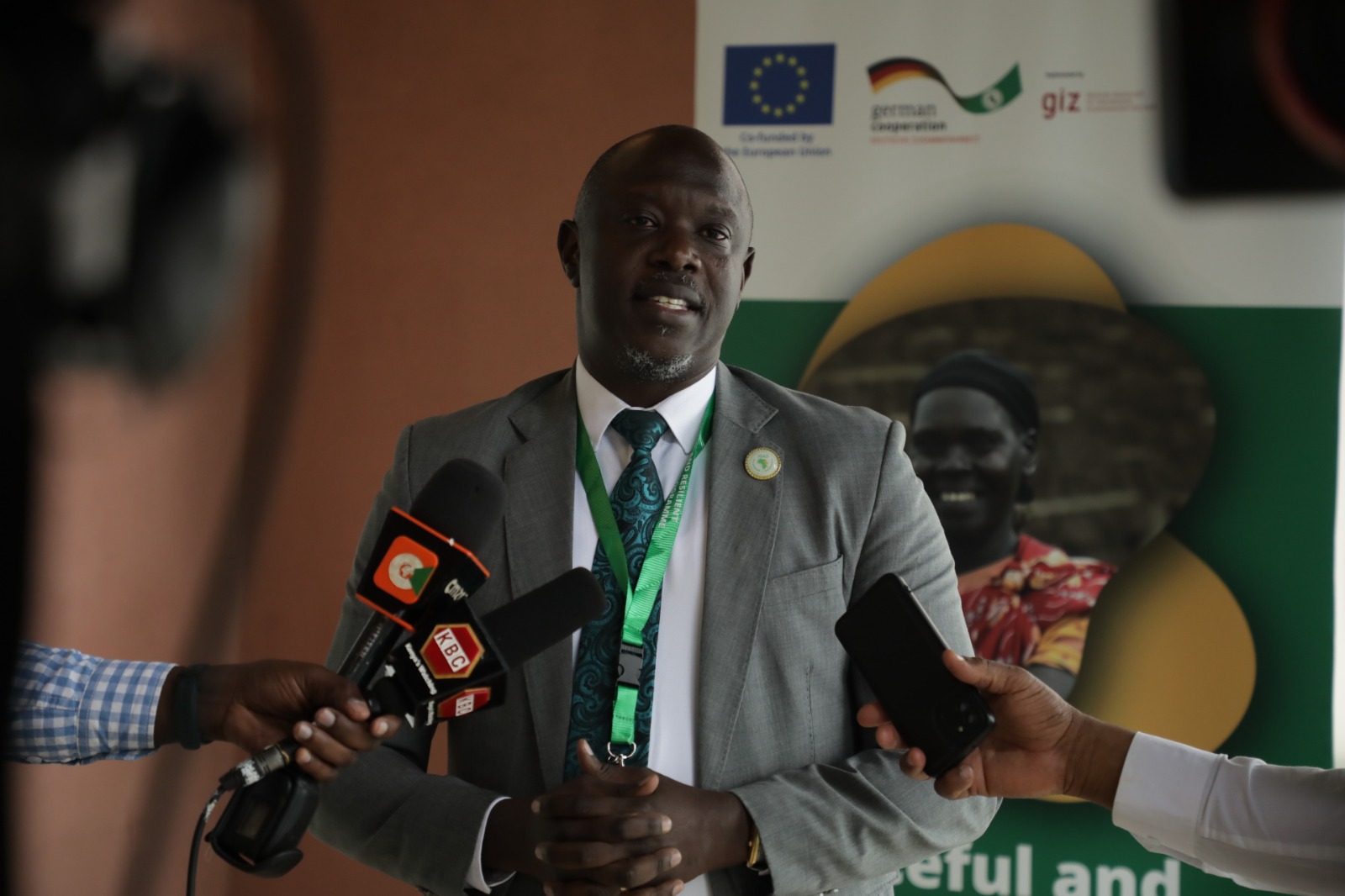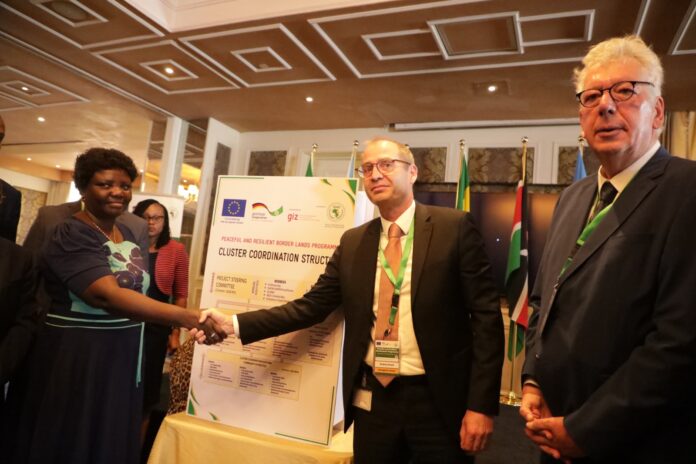|
Getting your Trinity Audio player ready...
|
By Morara Kebaso
Nairobi, Kenya: In response to climate change, peace, and security concerns, a new project has been launched covering a significant portion of the Intergovernmental Authority on Development (IGAD) region. This initiative aims to safeguard and build upon the progress made in addressing these critical issues.
Leaders from the region gathered yesterday and solemnly vowed to never again permit the catastrophic level of destruction that plagued the region due to four consecutive seasons of failed rainfall. The East African Community, Arid and Semi Arid Lands, and Regional Development Cabinet Secretary, Beatrice Askul, officially initiated a project aimed at preventing future occurrences of such devastation.
The launch of a three-year Peaceful and Resilient Borderlands Programme (PRBP) in Nairobi yesterday therefore signified the commitment by the IGAD member states to address the underlying risk factors that have constantly exposed the region to instability.
Community representatives, development partners, leaders, and implementers lauded the project, emphasizing its timeliness and significance as a symbol of hope for the region’s human and animal populations, numbering in the millions.
“Today marks a significant milestone in our collective efforts to foster stability, resilience, and development across the borderlands of the Horn of Africa,” Mohamed Ware, IGAD Deputy Executive Secretary said.
The Programme, which will span from February 1, 2024, to January 31, 2027, aims to enhance coordination and resilience in the IGAD border clusters of South Omo, Turkana, Mandera Triangle, and Borana/Moyale. The initiative is co-financed by the European Union and the German government through the Federal Ministry of Economic Cooperation and Development (BMZ), implemented by GIZ and coordinated by the IGAD.
The program aims to tackle the root causes of instability and conflict. Ware indicated that it will also bolster cross-border communities’ capacities for conflict prevention and mitigation..
“It will also enable the economic recovery and the strengthening of the resilience and social cohesion of these territories,” he stated through a statement.
Dr. Anthony Awira, the Authority’s Director of Planning, Coordination and Partnership represented Ware who was away in Somalia.
To achieve this, it was revealed that an integrated approach will be applied; covering peace building and resilience building, including resilience to climate change, capitalizing on the Humanitarian Development-Peace Nexus approach.

In the IGAD region, which encompasses Djibouti, Eritrea, Ethiopia, Kenya, Somalia, South Sudan, Sudan, and Uganda, a prolonged drought led to the loss of over 4 million animals and impacted approximately 36 million people across its eight member states.
Dr. Awira highlighted that the IGAD, which is over 70% Arid Semi Arid Lands (ASALs), requires specific tailored investments targeted to address the unique challenges of the region.
“But also, at the same time, those challenges need to be harnessed into opportunities because these regions are also hosting enormous resources,” he told journalists.
Over the years, the Peaceful and Resilient Borderlands programme supported the cross border communities to address their multifaceted challenges.
During the initial phase of the EU-sponsored program, sensitization campaigns on resilience-building strategies and fundamental rights successfully reached more than half a million community members. Additionally, the EU played a crucial role in supporting 7,816 transboundary markets and establishing linkages to facilitate participation in formal cross-border trade.
Ondrej Simek, the Deputy Head of Delegation of the European Union (EU) to Kenya explained that the first phase of the programme also yielded important lessons that have influenced the design of its second phase.
“One critical takeaway is the imperative of integrating community dialogues and consultations into our support framework. For instance, through these engagements, we discovered that female traders around Lake Turkana urgently needed enhanced security measures to safely conduct cross-border small-scale trade,” he said.
And in the Mandera or Somali triangle, he revealed that the EU collaborated with a local network of women peace-champions who proactively engaged non-local women in their initiatives.
“This grassroots effort significantly reduced prejudices and incidents of violence against non-local residents, illustrating the transformative power of inclusive community involvement,” Simek said.
He said the impact of extreme weather events on the Horn of Africa region including widespread drought, many countries faced severe flooding in the first months of 2024, revealing the harsh reality that threatens the livelihoods of millions of people.
“There is clearly an urgent need to empower communities with the necessary knowledge and tools to adapt to these evolving circumstances,” he said, pointing out that in the second phase of the programme, the EU and the Government of Germany intend to build on these initiatives.
Askul said the unveiling of the programme comes at a time when the horn of Africa is experiencing adverse effects of climate change including drought, floods, pests and diseases among others that have triggered resource-based conflicts and insecurity leading to humanitarian crises and displacements.
“The launch of this programme therefore signifies the start of an important strategic initiative aimed at promoting peace, resilience and sustainable development in this region,” she said.
The IGAD Peaceful and Resilient Borderlands Project will serve as a catalyst for promoting social cohesion, enhancing governance structures, and building robust mechanisms to withstand and recover from shocks such as droughts and conflicts.
“GIZ is particularly proud to be charged with the coordination role of this Programme. It complements our longstanding commitment to fostering sustainable development and stability in the Horn of Africa” noted Bodo Immink GIZ Kenya/Somalia Country Director.
Adding “Our role involves providing technical expertise, coordinating with various stakeholders, and ensuring the effective implementation of Programme activities. We are dedicated to strengthening the technical capacities of local and regional institutions to create a lasting impact” said Bodo.
The CS described the project as a beacon of hope for the millions of people living in the borderlands of the IGAD region. “Together, we have the opportunity to make a lasting impact, to build bridges of understanding, and to create a future where peace, resilience, and sustainable development are not aspirations but realities for all,” she stated.
Askul is keen to see the implementation of the project aligning with the existing national and sub-national initiatives to avoid overlap and duplication, while fostering synergies for enhanced efficiency.
“As the lead coordinating Ministry for development of ASALs in Kenya, we encourage and look forward to in-depth dialogue with implementers to ensure that activities are tailored to the needs of the communities, thereby promoting greater impact and accountability,” the CS urged.
Implementers of the project are members of the Non Governmental Organizations- NGO consortia including, the Danish Refugee Council, Danish Church Aid, and Life & Peace Institute, Mercy Corps among others.














